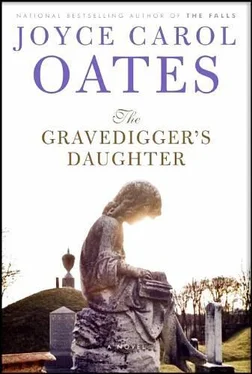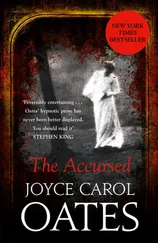Rebecca stared up at him, and saw how he hated her.
She would wonder what Jacob Schwart saw, in her: what there was in her, a child of five, he so despised.
She would be too young for years to consider He hates himself, in me . Still less It is life he hates, in all his children .
She ran outside. Stumbling, barefoot. The cemetery was a forbidden place, she was not to wander in the cemetery amid the rows of gravestones that signaled the resting places of the dead in the earth and were the possessions of others, those others who helped to pay Jacob Schwart’s wages; she knew, she had been told numberless times that those others did not want to see a child prowling aimless in the cemetery that belonged to them. Her brothers too were forbidden to enter the cemetery except as their father’s helpers.
Rebecca ran, blinded by tears. Where her father had grabbed her shoulder, she felt a throbbing pain. She whispered, “Freyda-” but it was useless, she knew it was useless, she was alone now and would be alone, she had no sister.
The cemetery was deserted, there were no visitors. The air was gusty and wet-tasting, the white-striated bark of birch trees shone with an unnatural glisten. In the taller trees, crows called raucously to one another. Where you could not hear Jacob Schwart’s voice, and could not see Anna Schwart turned away sobbing and broken in defeat, it was as if nothing had happened.
The cries of the burning passengers of the Marea -she could hear them. In her memory it would seem, yes the Marea had been set afire, she had seen the fire herself, she had seen her sister Freyda burned alive.
Why?-“Ask God why: why such things happen. Not me.”
She would hide in the cemetery, frightened for hours.
No one would call her name. No one would miss her.
The previous day there had been a funeral, a procession of cars and pallbearers carrying a coffin to an open grave site scrupulously prepared by Jacob Schwart, Rebecca had watched from a distance the mourners, she had counted twenty-nine of those others , some had lingered at the grave as if reluctant to leave and when at last they departed there came Jacob Schwart dark-clad and silent as a scavenger bird to fill in the grave, to cover the coffin with moist crumbly dirt, until there was only earth, the curve of earth, and a smooth granite headstone engraved with letters, numerals. And flowers in pots, set with care at intervals about the rectangular grave.
Rebecca approached this grave, that was some distance from the stone cottage. She was barefoot, limping. She had cut her left foot on a stone. In the summers she was a dark-tanned Indian-looking child furtive in appearance and often dirty, her tight-plaited hair beginning to pull loose in wisps. No wonder such a child was forbidden to wander in the cemetery where visitors might be startled and annoyed to see her.
Only when she saw her father’s pickup truck being driven away would she emerge from hiding to return to the house, and to her mother. She would take to Ma a handful of beautiful pale-blue cluster-flowers broken off from one of the potted plants.
Not-to-be-said from that time onward in the stone cottage in the Milburn cemetery were such words as “cousins”-“Morgenstern”-“boat”- Marea . Certainly you would not say “Kaufbeuren”-“Aunt Dora”-“Freyda”-“Germany.” Not that Ma might hear, or in her nervous confusion imagine she heard. Not that Pa might hear for he would fly into one of his spittle-rages.
Rebecca asked her brothers what had happened? what had happened to their cousins? was it so, the Marea had been set on fire? but Herschel shrugged and grimaced saying how in fuck would he know, he never thought anybody was comin‘ to Milburn anyway, not so far across the ozean with submarines now, and bombs. Also there was sure to be trouble about those damn vissas, like Pa had worried about for them.
“See, there ain’t room for everybody over here. There’s these miz’rable people worsen us, a million maybe. Like this damn house, you can figure it ain’t big enough for anybody else! You can figure it. The Yoo Ess Immigradion can figure it.”
Rebecca asked what that was: the Yoo Ess Immigradion.
“The police, like. Soldiers. They got to guard the Yoo Ess so it don’t get crowded with refugees, like. People tryin to get away from Hitler, you can’t blame em. But over here, you can’t blame em either, tryin to keep people out. Why they let us in,” Herschel said, grinning, scratching at the crotch of his overalls, “ I sure as hell don’t know. See I’m gonna en-list in the navy pilots, soon as I can. I’m hopin we go to war real soon.”
In that late summer of 1941 and well into the fall, Ma was in bed. Ma was sleeping, or Ma was lying awake-not-sleeping with her eyes closed, or Ma was lying awake-not-sleeping with her eyes open but unfocused, covered in a thin film like mucus that, drying, stuck to her eyelashes. If Rebecca whispered, Ma?-there would be no response usually. Maybe a flicker of Ma’s eyelids, as if a fly had buzzed too near.
Mostly the bedroom door was shut against the family except of course Pa could enter at any time (for there could be no room in the stone cottage from which Jacob Schwart might be barred) and at certain times Rebecca hesitantly entered bringing her mother food, and taking away dirtied plates and glasses to be washed, by Rebecca who had to stand on a chair for the task, at the kitchen sink. The bedroom was a small room only just large enough to hold a double bed and a chest of drawers. It was airless, smelly, dank as a cave. Ma refused to allow the window to be opened even a crack. As she tasted death in the well water so now she smelled death in the humid greeny-tinged air of the cemetery. A cracked and discolored blind was drawn on the window at all times of the day and night so that no one could peer inside.
For those others were keenly aware of the Schwarts in their stone cottage in the cemetery. All of Milburn, New York, was keenly aware. Since the Marea had been turned back in New York harbor surely everyone knew, and laughed their cruel, crude laughter like hyenas. You had to imagine how they laughed speaking of “Mrs. Schwarz”-“Mrs. Warts”-“the gravedigger’s wife”-who had ceased to appear in town and was believed now to be sick with some wasting disease like T.B., brain tumor, cancer of the uterus.
When Jacob Schwart was stone cold sober he entered his wife’s sickroom in finicky silence, and in silence undressed; he must have slept beside the woman’s inert fleshy perspiring body in silence; in the early morning, before dawn, he arose, and dressed, and departed. No doctor would be summoned, for Anna Schwart would have screamed and fought like a panicked wildcat if any stranger attempted to enter her place of refuge, nor did Jacob Schwart seem to consider that she was ill enough to require a doctor. Frugality had become so instinctive in him, he had no need even to consider those platitudes he had learned to mimic out of an infinity of word-formulae available to him in this new, still awkward and improvised language Dollar bills do not grow on trees. Want not waste not .
When Pa was drinking he became noisy and belligerent and stumbling-into-things, Rebecca could hear from her bed where she lay open-eyed in the dark waiting for something to happen that would in fact not happen for eight years. Sometimes when Pa was drunk he became jovial, garrulous talking to himself. He would curse, and he would laugh. Never would there be any audible response from Anna Schwart. When he settled heavily on the bed, you would hear the bedsprings creak as if the bed was about to break, and then often you would hear a spasm of coughing, phlegmy staccato coughing. Probably Pa would not trouble to undress, even to pull off his mud-splattered work shoes for the damn laces were hopelessly knotted.
Читать дальше












